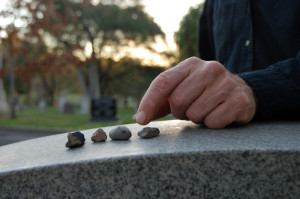On Grief & Loss
No one skates through life unscathed by the pain of loss and grief. Whether facing the death of a loved one or beloved pet, the loss of a job, divorces and breakups, health conditions that change our lifestyles, relocation to a new town, etc., loss is inevitably part of living a full life.
And for the most part, we share great similarities in how we respond to this challenge. Feelings of disbelief, numbing, sorrow, relief, confusion, anger, fear, spiritual expansion, loneliness and abandonment are common. We may question the philosophical or spiritual beliefs that have helped us define the world as it “ought” to be. We may even wonder about the point of making connection with others when we can end up feeling so distraught at their loss.

If we are fortunate, we have a community that supports us through the aftermath of loss. Family members, friends, mentors, elders, counselors and/or spiritual guides may offer comfort and wisdom that help us process and understand the intense feelings that can arise. When we embark on the path of rebuilding our lives and finding new meaning through grief, we may accept offers of help, or we may choose a more solitary and private approach. It really depends on the individual and the nature of the loss experienced. Additionally, cultural values and expectations can influence how we respond to loss and process grief, and these may change inter-generationally, as well. There is no “right way” to grieve.
In fact, grief is a fundamentally relational experience, meaning we all do it differently relative to what has been lost (be it a person, a job, a lifestyle, etc.). So despite popular misconceptions that there are five clearly defined “stages” to grief, the truth is that each experience of loss, and each journey through the grief following it, is as unique as the individual who suffers the loss.
There is, however, great veracity in the axiom that “time heals all wounds.” As many as 90 percent of people eventually rebound from loss with minimal assistance and are able to re-enter the world of relationships with some sense of openness and optimism.
But there are situations when time doesn’t seem to help and maladaptive beliefs about life and relationships begin to overwhelm a person. Sometimes, this is caused by unusual, perhaps even horrifying, experiences of loss, or by several experiences of loss that accumulate over time. For all our desire to return to “the person we used to be” before the loss, we may instead feel stuck in sorrow or plagued by feelings of guilt or outrage. We may become fixated on the loved one or situation that is lost to us, or we may feel held captive to memories associated with the experience of loss.
Such situations often call for the specialized assistance that a counselor adept in treating grief & loss issues can provide. Among these circumstances are specific and mercifully less-common experiences of grief, including traumatic bereavement, complicated grief and ambiguous loss.

For more typical experiences of loss, people often manage quite well without counseling. However, certain needs or desires may lead you to seek counseling, including:
- Comfort and support. Especially for people who don’t maintain a network of supportive family and friends, counseling can provide the attention and witnessing that is often an important part of processing feelings of grief. It is generally helpful for us to know someone else has seen and understands something of our loss
- Assistance accessing and processing feelings of grief. Often, in the rush of daily life, we don’t make space to sit down and attend to our emotional lives, which can be especially easy to avoid when the feelings arising are unpleasant. Because counseling helps with focusing on feelings and concerns, it may temporarily intensify the experience of grief and thus provide a clear, open time and space to address this sort of pain.
- A special time and place just for your grief. When a loss affects many people, as within a family, a close circle of friends or a workplace, it can be difficult to process our feelings with others who are also hurting, or who may even have feelings of antipathy about the loss or dislike someone who has died. Similarly, we often must resume our roles within these groups rather quickly, especially as a parent or workplace colleague, and that need to carry on may not leave us with much time to grapple with our feelings. Whether in support groups or individual counseling, knowing we have a special place and time set aside where our feelings get heard and validated can be of great comfort and facilitate healing.
- Not wanting to “burden” others. Because grief often involves an urge to recount the story of loss many times — a process that is part of dealing with feelings of disbelief, numbing and shock, as well as a way of making sense of what happened — people in grief are sometimes concerned that they will overwhelm or tire out their family and friends, especially if the loss involves delicate or shocking details. Counselors who specialize in grief work understand this process and are prepared to handle it.
- Trouble returning to “normal” functioning. Loss can turn our lives completely upside down, and disruption of routines is to be expected, with a gradual return to functioning over a period of months. But if this isn’t starting to happen after about six months, especially if work or relationship life is being seriously affected, it may be useful to seek counseling and explore reasons for this.
If you choose to seek grief counseling, you may do well to join a grief support group, as the presence of others who can relate to your sorrows and troubles often brings tremendous solace. Hospice organizations and local hospitals, particularly cancer care programs, often have lists of these resources in your local community. In Portland, Oregon, find up-to-date listings of therapy groups, including for grief & loss, on the Portland Therapy Center group therapy listings. For individual therapy, seek a counselor who specializes in grief and loss, or ask for referrals from friends or family members who’ve had effective grief counseling in the past, or from hospice workers, clergy, your primary care physician or, if your employment offers it, from an Employee Assistance Program (EAP).
Learn more about:
Traumatic Bereavement
Complicated Grief and Ambiguous Loss
